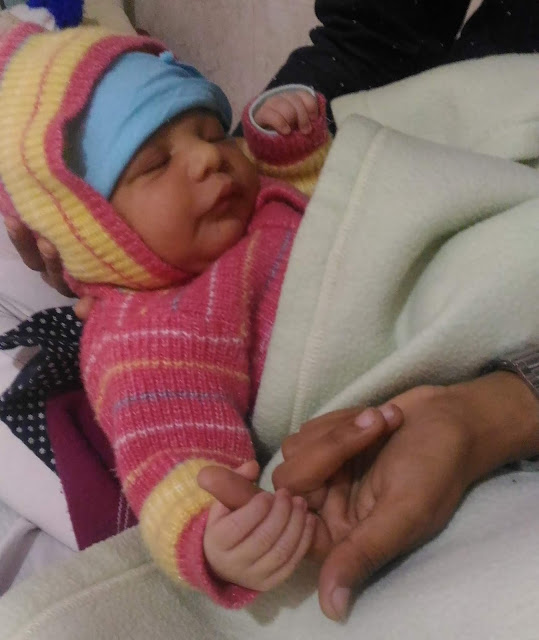When you are a newbie parent, it can feel totally overpowering to attempt to make sense of when your infant is acting like a typical infant, and when something isn't right.
Newborns are shockingly boisterous breathers on occasion. Wheezing, snuffling, grunting and snorting are generally superbly typical to get notification from a sound child.
Why Newborn Sneeze?
Newborn Sneezing is NORMAL.
- It is his method for clearing airborne cushion, dust and mucous from his nose and additionally drain, which can go up into his nose when he retches.
- Sneezing is totally something to be thankful for to see your infant doing. It implies that their sensory system is working accurately, in light of the fact that sniffling is really a reflex controlled by the sensory system.
- Newborns sneeze a considerable measure since they need to. Babies have littler nasal entries than grown-ups and may need to truly clear their noses more regularly than grown-ups do, since they can get stopped up more effortlessly.
- Newborns additionally inhale through their mouths as a component of their advancement, which can now and again add to the sneezing since they are as yet changing in accordance with breathing through the nose.
- Newborn children moreover breathe in through their mouths as a segment of their progression, which can every so often add to the wheezing since they are up 'til now changing as per breathing through the nose.
- Newborns also sneeze when you are breastfeeding in light of the fact that your infant has squeezed one nostril close against your skin. Your child may wheeze to open it up once more.
Newborn Sneezing Conclusion
In the event that your newborn wheezes aren't joined by some other indications of sickness, at that point more than likely you don't have anything to stress over. Rather, be consoled that her little body is carrying on precisely as it ought to be. Wheezes will normally help discharge germs and particles from the nasal entries and keep air streaming.
For whatever length of time that your infant isn't having any undeniable inconvenience breathing, it's smarter to not intercede with saline drops or a nasal suction apparatus. Give your little one's body a chance to work as per the manner in which it was planned. Those wheezes will enable keep to air moving in and out.
What are Newborn Hiccups?
Newborn hiccup much of the time in utero, and they for the most part keep on hiccuping once they are conceived. This is extremely typical, and is for the most part caused by the sudden, unpredictable constrictions of their youthful stomach, the muscle that backings their lungs. As your child develops more established, his hiccups will reduce as his stomach and the muscles between his ribs and in his guts, wind up more grounded and more synchronized.
Newborn hiccups are totally innocuous and only one indication of infant's development and advancement.
Why Newborns Hiccups so often?
- Newborn Hiccups are caused by fits of child's little and creating stomach, the vast muscle that keeps running over the base of the rib pen and climbs and down as we relax.
- Newborn Hiccups are most habitually caused when child overloads, eats too rapidly or swallows a considerable measure of air.
- Newborn Hiccups can also be the result of sudden changes in stomach temperature.
- Newborn Hiccups can be sometimes caused due to gastroesophageal reflux also.
How to cure Newborns Hiccups?
- The way to forestalling newborn hiccups is to abstain from overloading. Take breaks amid feedings to burp infant so the stomach doesn't fill excessively, too rapidly.
- Using a pacifier may loosen up the stomach and quit hiccupping.
- Taking a break from a sustaining to burp your child may help dispose of the hiccups, since burping can dispose of overabundance gas that might cause the hiccups.
- Use of Gripe water may ease the baby from long hiccups.
- Holding child up for a couple of minutes after feedings can help anticipate infant hiccups.
- In the event that they aren't irritating your child, at that point you can simply give them a chance to run their course.
- After a nourishing, stay away from substantial movement with your infant, for example, skipping here and there or high-vitality play.
What not to do in Newborn Sneeze and Newborn Hiccups?
- Putting wet cloth on baby's forehead.
- Don't start playing or making sudden movements with baby physically.
- Start feeding the baby when he is calm, don't force feed baby.
- Don't make baby drink water or any liquid when he is up side down.
- Numerous individuals suggest pulling on infant's tongue and pushing on his forehead.. NO it won't help.
- Do not even try to hold breath of baby to ease him. NO.
Newborn Hiccups Conclusion
The hiccups ought to leave when your child achieves their first birthday celebration. Infant hiccups are not more often than not a reason for concern. Following encouraging prescribed procedures may diminish hiccupping, and some home cures may likewise help.
In the case of hiccupping is visit, or on the off chance that it causes trouble or different side effects, talk with a specialist. It is likewise a smart thought to contact a specialist if hiccups much of the time happen following an infant turns one year old.





hey mommy nice tips thank you
ReplyDelete